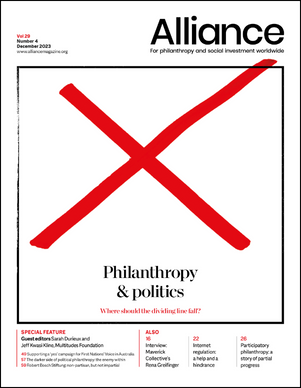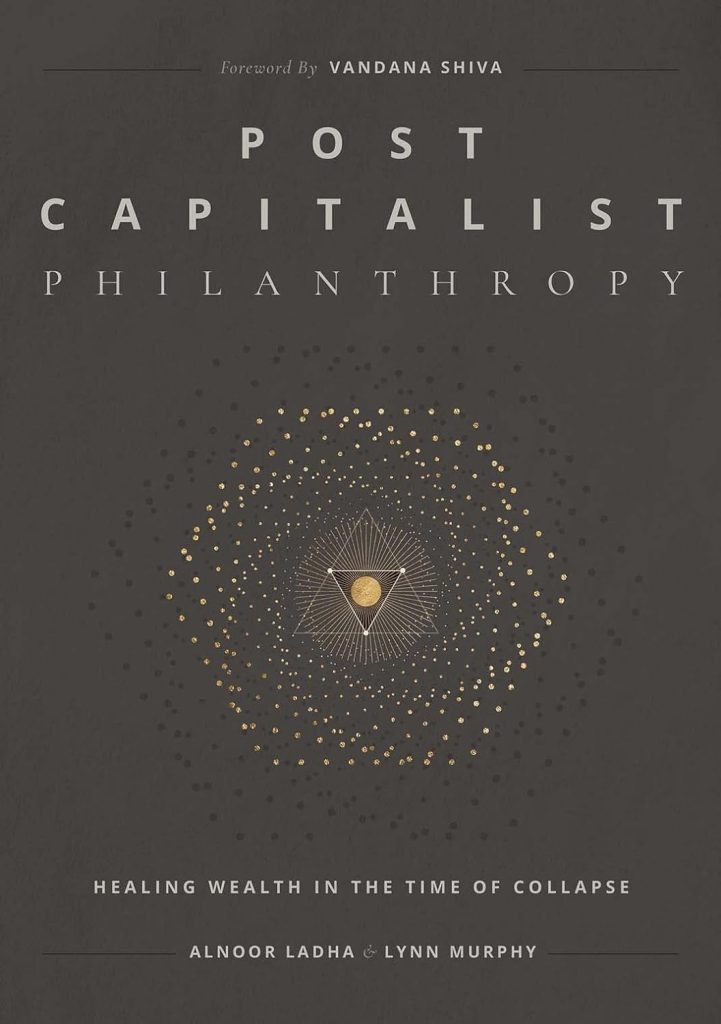Reviewed by Vanessa Thomas, Black Feminist Fund
Post Capitalist Philanthropy by Alnoor Ladha and Lynn Murphy is a beautiful offering, at a time, when we all navigate a world on fire, in both literal and metaphorical senses of the word. Ladha and Murphy capture the frequent, existential question a lot of grantmakers have. We know we work in a sector that should not exist, we know that the revolution will not be funded, but we also know that money matters! For movements to flourish, create change, and model the freedoms for a just society, resources need to flow. Whilst this book does not (and cannot) provide a simple guidebook to fix all worldly ails, it is an offering into how we contend with the paradox of philanthropy, furthermore, stay with the trouble.
The book begins with a Foreword by Dr Vandana Shiva, an activist, philosopher and so much more. It is then broken into four parts, with several chapters. Paradox before possibility; Into the Paradox; From Paradox to Emerging Possibilities; From Pyramid Logic to Spiral Logic and finally Walking into the Unknown. It feels important to share each part, so you can get a small insight into the magic of this book, and the trajectory it takes the reader on. In Part One, the authors grapple with the paradox of philanthropy, highlighting conversations many of us as grantmakers have had with our peers. Philanthropy as we know it today must be understood within the wider structure of neo-liberalism, it is not separate or distinct but very much part. Understanding this then means we acknowledge our current systems which are rooted in profit above all else, and the extraction of predominantly Black and brown labour and the natural world. Late-stage capitalism and everything we see today from conflicts to the climate emergency are a consequence of this.
We then move onto the Emerging Possibilities. Ladha and Murphy provide rich, deep and thoughtful offerings, collated from many conversations with elders, activists, grantmakers and more. They explore the Just Transitions movement, which as in the name, models a transition out of exploitative systems. Noting that whilst a step in the right direction, this movement is limited for the pace and the focus on existing polity. Ladha and Murphy propose we move into ‘new-ancient-emerging’ futures completely outside of the current structures and knowns. This phrase ‘new-ancient-emerging’ futures repeats throughout the book and perfectly encapsulates practices that are as old as time itself and emerging ways of being.
Moving to the final part of the book, Ladha and Murphy invite the reader to journey through a Five Elements Mandala (Sanskrit for circle), as a way to focus or guide a practice. Through each element, earth, air, water, fire and ether, the authors explore how we can use capital to create post-capitalist realities. With current examples and ancient future propositions, they illustrate a plethora of ways this can be done in philanthropy, from showing genuine solidarity with social movements e.g. racial and gender justice, to supporting local land trusts and spending in (commonly referred to as spend-downs).
Post Capitalist Philanthropy is not a light or easy read, it is calling you to act, it is calling you to feel. It is calling you to question, what conditions framed your life choices and environment, and crucially an invitation for us to see the heart work as equal to the head work. Although the reader is taken deep into the philosophical, reflection exercises throughout the book allow you to pause, reflect and contextualise the words with your day to day, grounding heart, head and body.
‘Imagine we created a reality where we only engaged in activities that create conditions for the emergence of beauty, life-force and enchantment?’.
Well, Post Capitalist Philanthropy provides the mandala for exactly that. The book is a balm, reminding us that our healing is mutual and ancient futures are possible.
About the book
Author: Alnoor Ladha and Lynn Murphy
Published by: Transition Resource Circle
To order: tinyurl.com/ladha-murphy




Comments (0)